Jewish History
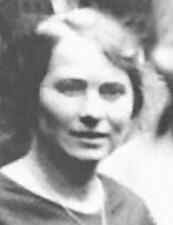
Sabina Spielrein

Sport in Israel: Yishuv to the Early 21st Century
Women have been involved in sports in Israel since the Yishuv period, participating as teams, as individuals, and as coaches. Though more women are now participating in competitive sports, the field still reflects a masculine culture of power struggle and a desire to defeat the enemy. More recent political efforts in Israel have attempted to achieve women's equality in athletics.

Sports in Austria 1918-1938
This article gives an overview of the participation of Jewish women in Austrian sport from the Habsburg monarchy to the present day. Drawing on selected biographies of sportswomen and functionaries, and with a regional focus on the capital city of Vienna, it explores the double relationship between female emancipation and Jewish self-assertion in an environment that had long been male-dominated and anti-Semitic.
Sports in Germany: 1898-1938
Women’s participation in Jewish gymnastics clubs increased significantly during the first two decades of the twentieth century. The Jewish sports movement grew during the 1920s, allowing women to participate in cross-country running, swimming, and tennis. After German sports clubs annulled Jewish membership in 1933, women poured into these Jewish sports groups.
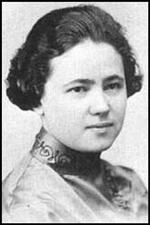
Mollie Steimer
Mollie Steimer earned nationwide attention for her refusal to compromise her anarchist beliefs during the widely publicized 1918 trial in which she was sentenced to prison under the Sedition Act. Later deported to Russia and then to Germany, Steimer continued her anarchist activities throughout her life.
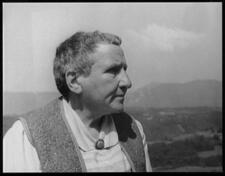
Gertrude Stein
Hannah Stein
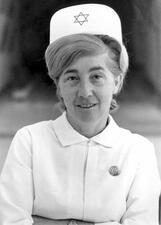
Judith Steiner-Freud
As a Holocaust survivor, Judith Steiner-Freud fulfilled her faithful and influential mission. From the 1940s to the 2010s, she devoted herself to the calling of transforming nursing into an academic profession, raising the status of Israeli nurses, and promoting the welfare of Israeli society and other diverse population groups.
Jewish Gender Stereotypes in the United States
Stereotypes of Jews have existed from their arrival in the New World to the present. Jews were portrayed as greedy, unscrupulous, and unrefined. However, Jews also created stereotypes about one another based on class, gender, and religion. Specifically, the Ghetto Girl, Jewish Mother, JAP, and others reflected tensions between genders about the place of Jews in the economy and culture.
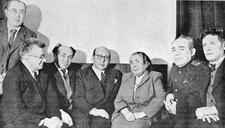
Lina Solomonovna Stern (Shtern)
Lina Shtern, biochemist and physician, was the first woman professor at the University of Geneva and the first woman named to the Soviet Academy of Sciences. Born in Latvia, then part of the Russian Empire, she returned to the Soviet Union out of political idealism. A member of the Jewish Anti-Fascist Committee during World War II, she was a victim of postwar repressions that targeted both scientists and Jews.
Eva Michaelis Stern
Eva Michaelis Stern was co-founder and director of the fundraising arm of the Youth Aliyah in Germany, and later the director of the Youth Aliyah office in London. Over the course of WWII, she helped more than 1000 children from countries all over Europe immigrate to Palestine.
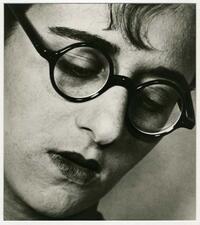
Grete Stern
Grete Stern was one of the founders of Argentina’s modern photography. After studying photography in bohemian Berlin and at the legendary Bauhaus School, Stern developed an unconventional approach to photography, including advertisement collages and studies with crystals, objects, and still-lifes. Between 1935 and 1981 Stern was an influential artistic presence in Argentina, known for her photographic work, graphic design, and teaching.
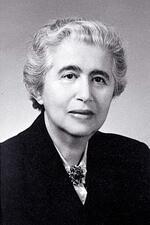
Selma Stern-Taeubler
Originally a historian and researcher in Heidelberg and Berlin, Selma Stern-Taeubler settled at the Hebrew Union College in Cincinatti after fleeing Nazi Germany. She became the first archivist of the American Jewish Archives at the college and later wrote books of fiction and nonfiction. Despite her contributions to Jewish history, American-Jewish academe has largely undervalued Stern-Taeubler’s work, which continued until her death in 1981.
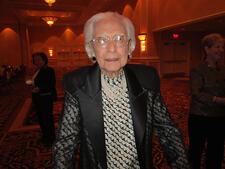
Sara Stone
Lillian Laser Strauss
Lillian Laser Strauss performed pioneering work in public health and child welfare in Pennsylvania, became a lawyer at age fifty, and, in the midst of active legal advocacy for public health, died suddenly of a heart attack at age fifty-six.
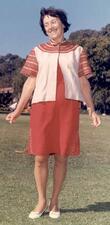
Rivka Sturman
Suburbanization in the United States
Jews migrated in large numbers to newly constructed suburbs after World War II and the end of restrictive covenants that had excluded them. During the day, suburbs were largely female spaces where married Jewish women cared for their children and private homes, while volunteering for Jewish and civic activities. Jewish daughters raised in suburbs enjoyed middle-class comforts but also experienced pressures to conform to American gentile ideals of beauty.
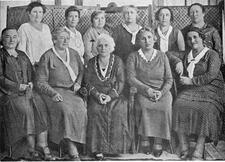
Suffrage in Palestine
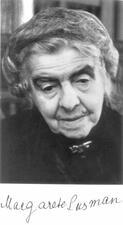
Margarete Susman
Margarete Susman published her first writings, a book of poetry, in 1901 and went on to have a prolific writing career that included plays, books, and journal articles. Susman combined literature and theory, often reflecting seminal texts of modern theory and addressing political issues and women’s rights. Her writings concentrate on the most problematic issues of the modern world: God and human beings, man and woman, Jew and Christian.
Nettie Sutro-Katzenstein
Marie Syrkin
Marie Syrkin is best known as a polemicist for the State of Israel, whose keen arguments appeared in a wide range of publications for a period of almost seventy years. Her life touched almost every significant aspect of Jewish life in America and Europe in the twentieth century.
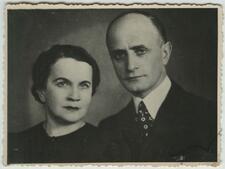
Bela Szapiro
Before World War II, Lublin was one of the largest Jewish communities in Poland. Bela Szapiro’s activities contributed to making it the vibrant cultural and political center of Polish Jewry that it was.
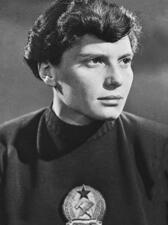
Eva Szekely
Born in Budapest, Eva Szekely was forced to stop swimming during the Nazi occupation of Hungary. However, she returned to the sport after the war and went on to win thirty-two national individual swimming titles and eleven national team titles. At the 1952 Olympic Games in Helsinki, she set a new Olympic record in the 200-meter breaststroke.
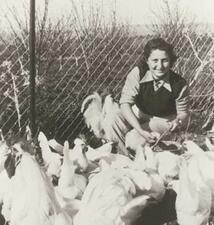
Hannah Szenes (Senesh)
Hannah Szenes has attained legendary status in the pantheon of Zionist history. After immigrating to Israel, Szenes agreed to participate in a military operation as a paratrooper. Hungarian authorities captured her and tortured her, but Szenes refused to talk. She was killed by a firing squad in 1944. Szenes mother published her daughter’s diary, poetry, and plays posthumously.
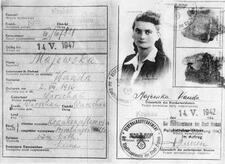
Tema Sznajderman
Tema Sznajderman was a fearless operative in the Jewish resistance to Nazism. She assumed undercover identities to investigate and transfer vital information across borderlines.


